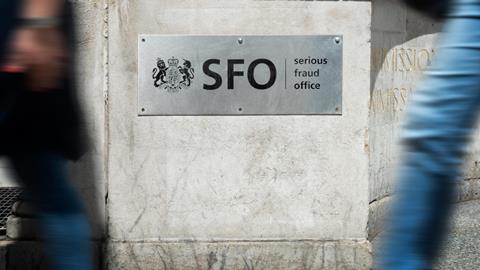Monday's entry into force of the new offence of failure to prevent fraud under the Economic and Corporate Transparency Act 2023 (ECCTA) has prompted warnings from specialist lawyers to businesses that fail to update their compliance procedures.
Tom Epps, white-collar defence and investigations partner at Cooley, described the measure as 'a landmark piece of legislation' for enforcement agencies. 'The act will have a material impact on the manner in which the UK authorities combat fraud and other economic crimes and in broad terms it makes it easier for prosecutors to hold companies criminally liable,' he said.
The new offence comes against the background of intensified international efforts such as the Serious Fraud Office's partnership with the International Anti-Corruption Coordination Centre announced in June, Epps noted. Meanwhile, the SFO is seeking powers to incentivise individuals and companies to come forward and report offences in the UK rather than overseas.
'Together with the new HMRC whistleblowing scheme that has been previewed, and the broadening of criminal liability pursuant to the ECCTA, we may see an uptick in whistleblowing and corporate self-reports and investigations arising from those reports,' he predicted.
Katie Stephen, partner and co-head of the contentious financial services group at Norton Rose Fulbright, said: 'The SFO will be keen to bring the first prosecution for the new offence, so that companies "feel the bite". Nobody wants to be the test case, so in-scope entities shouldn’t rest on their laurels.
'If a fraud takes place, organisations may need to demonstrate that they have effective anti-fraud procedures and have kept these under review. They should continually enhance their controls to reflect any new and emerging fraud risks, as this could help in securing a defence.'
Anneka Randhawa, partner at White & Case, pointed to the potential need to cater for whistleblowers in an organisation. 'Businesses without proper reporting channels risk being caught off guard, potentially first hearing of issues when law enforcement comes knocking. Even though whistleblowing systems aren’t mandatory for all companies, they’re fast becoming a key part of any credible fraud, bribery, and tax evasion prevention strategy. Strong whistleblowing policies and clear "speak-up" mechanisms are critical for any organisation looking to stay ahead of risk.'
Neil Donovan, partner at Ashurst’s dispute resolution practice, noted challenges associated with the reach of the offence. 'During the 10-month implementation window, in-scope organisations have grappled with two challenges: first, the breadth of conduct caught by the definition of fraud, which includes false accounting and tax evasion; and second, its wide extra-territorial reach, which extends to overseas companies where they fail to prevent fraud with a UK nexus. In response, businesses have undertaken risk assessments to determine the likelihood of fraud being committed for their benefit of the benefit of their clients, rolled out anti-fraud training for employees and subsidiaries, implemented anti-fraud policies, and refreshed compliance provisions in third-party contracts.'
Donovan added that the new offence takes on heightened significance when viewed alongside the test introduced in 2023 for attributing criminal liability to corporates for a wide range of economic crimes committed by senior managers. 'There is no doubt that the enhanced prosecutorial toolkit increases the risks of criminal liability for corporates and will shape how organisations respond to suspected criminality within their business.'
This article is now closed for comment.




























5 Readers' comments